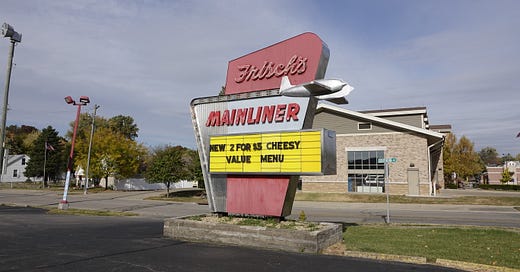Frisch's Mainliner: Farewell to the fabulous flagship of this Big Boy chain
A tribute the heart of the chain that closed in December 2024
When I visited Frisch’s Mainliner in Fairfax, Ohio, back in October 2022, I wasn’t the least bit concerned about its future. This location, and the overall Frisch’s Big Boy chain, seemed healthy, and the Mainliner was the pride of the fleet, where Dave Frisch in 1939 founded his own Mainliner restaurant — Cincinatti’s first year-round drive-in — and eventually allied it to the Big Boy franchise he secured from Bob Wian, the founder of Bob’s Big Boy. Frisch’s Big Boy expanded rapidly and became the biggest Big Boy operator, bigger than Bob’s itself.
During my visit, it was unmistakable that Frisch’s Big Boy was beloved. The health of any institution can be measured in part by how it respects its history. Frisch’s history was in good hands here at the Mainliner, where the dining room doubled as a museum, a reliquary for all things Frisch’s Big Boy.
I would never have guessed that this chain would be in freefall a little more than two years later, and the great Mainliner would be no more. But here we are: dozens of locations that couldn't make the rent are now closed, saddled with a sale-leaseback deal with roots in the 2015 sale of the company, first to private equity and later, the subsequent sale of dozens of the restaurants to Orlando-based NNN REIT, a real estate investment trust, which leased back those stores to Frisch’s. NNN sued the stores over failure to pay rent and sought their evictions.
This stuff is complicated. According to the Cincinnati Enquirer, “in sale-leaseback transactions, the buyer (NNN Reit) wins in the long run. By buying a piece of property that already generates income and then annually increasing the rent, they get a significant return on investment at a relatively low risk.”
The restaurants were now yoked with increasing rents they once didn’t face, as well as the need to pay property taxes and all other operational costs like maintenance and insurance. They also had to cope with the existential problems posed by the pandemic—mandated store closures, less foot traffic after stores reopened, inflation, and labor shortages, none of which were imagined back in 2015—along with never-ending changes in consumer tastes and habits that can complicate a business model even without something as disruptive as a pandemic.
“There are plenty of examples of companies who went into this type of real estate strategy with good intentions and it just didn’t work out,” Carl Goertemoeller, executive director of the University of Cincinnati’s Real Estate Center, told WCPO’S Dan Monk. “I hope that’s not the case with Frisch’s but we’ve seen this movie before.”
So when the day came the rent could not be paid, the REIT did what it was obligated to do and set into motion eviction. (The REIT has to pay 90 percent of the taxable income they generate from rent to shareholders, so there is no wiggle room when rent isn’t paid, the Cincinnati Enquirer reports.)
Fortunately, not all of the Frisch’s Big Boys are owned by REITs, and a nucleus of restaurants will carry on, and hopefully, be able to expand one day. But the damage to this institution — an iconic name in a region with fabled brands like Skyline Chili and Graeter’s Ice Cream — is done, and the loss of the heart of the chain is unbearable.
As a tribute to the Mainliner and to this now-sullied icon of Cincinnati, I present a photographic tour of this Frisch’s store in happier times, not long ago.
Keep reading with a 7-day free trial
Subscribe to The Retrologist by Rolando Pujol to keep reading this post and get 7 days of free access to the full post archives.





